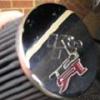Ceramic Stockies
Announcements
-
Similar Content
-
Latest Posts
-
If you are Ecutek tuned then these TCU tunes are anywhere from $550 to $700 usd. If you are not ECUTEK tuned, then it gets costly!
-
Sorry to hear your HFM BM57 was faulty, did you contact HFM I would hope they would be at least grateful for the information if there was some sort of manufacturing fault, you would hope they would be sympathetic even if your item was 2 years old if it had never been fitted. May I ask where it leaked from ?
-
Cats are called Bella, and Donna... Like that poisonous plant And I remember your 2 monsters, I remember making a little bit of wee when you let them out... LOL I have already installed cat doors into the laundry where their kitty litter is, and the sun room, apart from the cat doors there's not going to be any permanent mounted stuff on the interior walls (interior doors are cheap and easy to replace) I will get a outdoor cat cage thingie once I finish the landscaping out back... https://catnip.com.au/ The only off limit areas are the main bedroom and the gym room....but, currently the cats are curled up in bed, in the main bedroom with the Mrs.....LOL, the off limits for the kittens to the main bedroom lasted about 5 minutes with Jackie I currently only have 1 free standing huge cat tree multiple level scratching post thingie in the lounge room, but, I will be getting another one soon now that I'm happy with the furniture layout in the back room and have a perfect spot for it
-
By joshuaho96 · Posted
All of this is making it seem clear that running the Coppermix twin was definitely the way to go, especially in hindsight with how insane tariffs have gotten and the strength of the USD vs yen at the time. -
That sounds like no chance of even importing one for road registering then Now I see why Duncan wants to check LHD rules for Targa... I wonder how "bolt in" the AWD would be if you got one imported from the US and swapped it to an AUD one
-





Recommended Posts
Create an account or sign in to comment
You need to be a member in order to leave a comment
Create an account
Sign up for a new account in our community. It's easy!
Register a new accountSign in
Already have an account? Sign in here.
Sign In Now